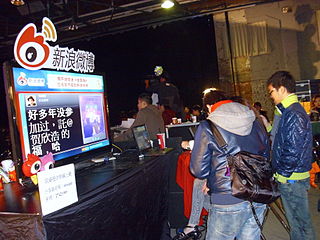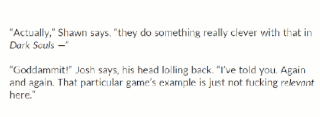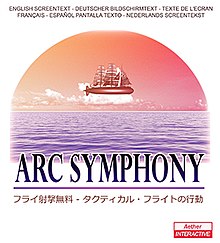A frequently asked questions (FAQ) list is often used in articles, websites, email lists, and online forums where common questions tend to recur, for example through posts or queries by new users related to common knowledge gaps. The purpose of a FAQ is generally to provide information on frequent questions or concerns; however, the format is a useful means of organizing information, and text consisting of questions and their answers may thus be called a FAQ regardless of whether the questions are actually frequently asked.

A live action role-playing game (LARP) is a form of role-playing game where the participants physically portray their characters. The players pursue goals within a fictional setting represented by real-world environments while interacting with each other in character. The outcome of player actions may be mediated by game rules or determined by consensus among players. Event arrangers called gamemasters decide the setting and rules to be used and facilitate play.

Spamming is the use of messaging systems to send multiple unsolicited messages (spam) to large numbers of recipients for the purpose of commercial advertising, for the purpose of non-commercial proselytizing, for any prohibited purpose, or simply repeatedly sending the same message to the same user. While the most widely recognized form of spam is email spam, the term is applied to similar abuses in other media: instant messaging spam, Usenet newsgroup spam, Web search engine spam, spam in blogs, wiki spam, online classified ads spam, mobile phone messaging spam, Internet forum spam, junk fax transmissions, social spam, spam mobile apps, television advertising and file sharing spam. It is named after Spam, a luncheon meat, by way of a Monty Python sketch about a restaurant that has Spam in almost every dish in which Vikings annoyingly sing "Spam" repeatedly.

Guerrilla marketing is an advertisement strategy in which a company uses surprise and/or unconventional interactions in order to promote a product or service. It is a type of publicity. The term was popularized by Jay Conrad Levinson's 1984 book Guerrilla Marketing.
Advertising in video games is the integration of advertising into video games to promote products, organizations, or viewpoints.

alt.tv.simpsons is a usenet newsgroup dedicated to discussing the American television program The Simpsons. Created in 1990, the newsgroup became a popular community in the early 1990s, and continues to exist as of 2023. It is known for reviewing episodes and nitpicking minor details on the show.

I Love Bees was an alternate reality game (ARG) that served as both a real-world experience and viral marketing campaign for the release of developer Bungie's 2004 video game Halo 2. The game was created and developed by 42 Entertainment. Many of the same personnel had previously created an ARG for the film A.I. titled The Beast. I Love Bees was commissioned by Microsoft, Halo 2's publisher and Bungie's ultimate parent company at the time.

In computing, an avatar is a graphical representation of a user or the user's character or persona. Avatars can be two-dimensional icons in Internet forums and other online communities, where they are also known as profile pictures, userpics, or formerly picons. Alternatively, an avatar can take the form of a three-dimensional model, as used in online worlds and video games, or an imaginary character with no graphical appearance, as in text-based games or worlds such as MUDs.

Interactive media normally refers to products and services on digital computer-based systems which respond to the user's actions by presenting content such as text, moving image, animation, video and audio. Since its early conception, various forms of interactive media have emerged with impacts on educational and commercial markets. With the rise of decision-driven media, concerns surround the impacts of cybersecurity and societal distraction.
Jamie Kane is an alternative reality game created by the BBC, aimed primarily at teens, aged 14 years to 18 years, appealing to both sexes due to its mix of mystery and drama. The game is named after the main character in it, a fictional pop star. In addition to a primary web site, the game is noted for involving interspersing fictional content related to the game in many of the BBC's web sites, including fictional interviews between BBC Radio 1 presenters and Jamie Kane, fake Top of the Pops appearances by the character, and fake BBC News reports of the character's death. The aim of the game was for players to unravel the mystery of that death, solving online puzzles and following clues that were available from a variety of sources.

Digital signage is a segment of electronic signage. Digital displays use technologies such as LCD, LED, projection and e-paper to display digital images, video, web pages, weather data, restaurant menus, or text. They can be found in public spaces, transportation systems, museums, stadiums, retail stores, hotels, restaurants and corporate buildings etc., to provide wayfinding, exhibitions, marketing and outdoor advertising. They are used as a network of electronic displays that are centrally managed and individually addressable for the display of text, animated or video messages for advertising, information, entertainment and merchandising to targeted audiences.
The Lost Experience was an alternate reality game that was part of the American television drama Lost. The game was developed by ABC in the United States, Channel 4 in the UK, and Channel 7 in Australia. It was written by Jordan Rosenberg and created by the agency Hi-ReS!. The experience played out during Lost's second season in the United Kingdom and during the summer break in the United States until the launch of season 3. The Lost Experience, which was announced by the United Kingdom's Channel 4, Australia's Seven Network and the United States' ABC on 24 April 2006 and began in May 2006, used websites, voice mail, television and newspaper ads and a novel to give players clues to the game. The Lost Experience ended on September 24, 2006. Damon Lindelof has verified the canonical status of The Lost Experience and the information provided therein.

Social media are interactive technologies that facilitate the creation and sharing of content, ideas, interests, and other forms of expression through virtual communities and networks. While challenges to the definition of social media arise due to the variety of stand-alone and built-in social media services currently available, there are some common features:
- Social media are interactive Web 2.0 Internet-based applications.
- User-generated content—such as text posts or comments, digital photos or videos, and data generated through all online interactions—is the lifeblood of social media.
- Users create service-specific profiles for the website or app that are designed and maintained by the social media organization.
- Social media helps the development of online social networks by connecting a user's profile with those of other individuals or groups.
A Usenet personality was a particular kind of Internet celebrity, being an individual who gained a certain level of notoriety from posting on Usenet, a global network of computer users with a vast array of topics for discussion. The platform is usually anonymous, although users can get celebrity status, usually by being deemed different from other posters in some way.
Heroes Evolutions is a digital extension of the NBC series Heroes that explores the Heroes universe. It was originally entitled Heroes 360 Experience but the name was changed for Season 2.

Social media marketing is the use of social media platforms and websites to promote a product or service. Although the terms e-marketing and digital marketing are still dominant in academia, social media marketing is becoming more popular for both practitioners and researchers. Most social media platforms have built-in data analytics tools, enabling companies to track the progress, success, and engagement of ad campaigns. Companies address a range of stakeholders through social media marketing, including current and potential customers, current and potential employees, journalists, bloggers, and the general public. On a strategic level, social media marketing includes the management of a marketing campaign, governance, setting the scope and the establishment of a firm's desired social media "culture" and "tone."

Social media and television have a number of connections and interrelationships that have led to the phenomenon of Social Television, which is an emerging communication digital technology that centers around real-time interactivity involving digital media displayed on television. The main idea behind Social Television is to make television consumption a more active content experience for audiences. In the 2010s, social media platforms and websites allow for television shows to be accessed online on a range of desktop and mobile computer devices, smartphones and smart TVs that are still evolving today in the 2020s. Alongside this, online users can use social media websites to share digital video clips or excerpts from TV shows with fellow fans or even share an entire show online. Many social media websites enable users to post online comments on the programs—both negative and positive—in a variety of ways. Viewers can actively participate while watching a TV program by posting comments online, and have their interactions viewed and responded to in real time by other viewers. Technologies such as smartphones, tablets, and laptop computers allow viewers to watch downloaded digital files of TV shows or "stream" digital files of TV shows on a range of devices, both in the home and while on the go. In the 2020s, many television producers and broadcasters encourage active social media participation by viewers by posting "hashtags" on the TV screen during shows; these hashtags enable viewers to post online comments about the show, which may either be read by other social media users, or even, in some cases, displayed on the screen during the show.
The Meow Wars were an early example of a flame war sent over Usenet which began in 1996 and ended circa 1998. Its participants were known as "Meowers". The war was characterized by posters from one newsgroup "crapflooding", or posting a large volume of nonsense messages, to swamp on-topic communication in other groups. Ultimately, the flame war affected many boards, with Roisin Kiberd writing in Motherboard, a division of Vice, that esoteric Internet vocabulary was created as a result of the Meow Wars.

The Writer Will Do Something is an interactive fiction video game written by Matthew S. Burns and Tom Bissell and created using Twine.

Fakemon, also called Fakémon, are fan-designed fictional creatures based on the Pokémon franchise of monster-taming games.













